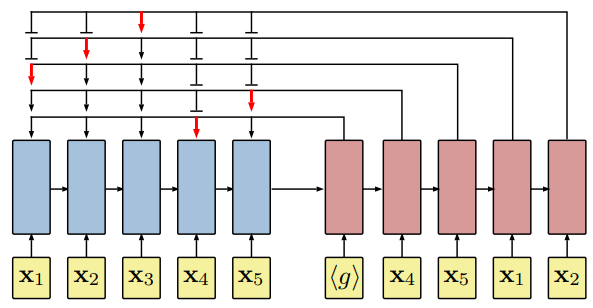0. Abstract
이 논문은 Deep RL로 CO문제를 푸는 framework를 제안한다.
1. Introduction
CO는 CS의 근본적인 문제로 이들은 다양한 분야에서 적용된다.
TSP 해 찾기는 NP-hard이다.
Heuristic work등이 있지만, condition의 변화에 적용이 불가능해진다.
반대로 ML은 heuristic을 training data에서 자동으로 찾기 때문에 다양한 condition에 적용될 수 있다.
지도학습의 label에 대한 요구로 인해 대부분의 CO에 적용되기 어렵다.
우리는 SL보다 RL이 generalization이 더 좋음을 실험적으로 보인다.
- Policy gradient approach
- Policy is parameterized by RNN
- At test time, inference by greedy sampling
- Active search
- Search 동안의 좋은 solution들을 유지하면서 최적화??
- 혼합
NCO는 pointer network의 지도학습 방법보다 더 낫다.
2. Previous work
TSP를 근사적으로 푸는 heuristic들이 있었다.
이보다 더 일반적인 문제인 Google’s vehicle routing problem도 있다.
No Free Lunch theorem : 다양한 search 알고리즘들은 모든 문제를 고려하게 될 경우 거기서 거기다.
결국 사전 지식에 기반해서 문제 상황에 적절한 것을 골라야 한다.
최근 Pointer Network가 뉴럴넷 기반으로 이 문제를 다뤘다.
3. Neural Network Architecture For TSP
- $n$ : number of cities
- $s=\left\{\mathbf{x}_{i}\right\}_{i=1}^{n}$ where $\mathbf{x}_{i} \in \mathbb{R}^{2}$
- $\pi \in \pi(s)$ : permutation of $s$
- $L(\pi \mid s)=\left|\mathbf{x}_{\pi(n)}-\mathbf{x}_{\pi(1)}\right|_{2}+\sum_{i=1}^{n-1}\left|\mathbf{x}_{\pi(i)}-\mathbf{x}_{\pi(i+1)}\right|_{2}$
- $p(\pi \mid s)=\prod_{i=1}^{n} p(\pi(i) \mid \pi(<i), s)$
Vanilla sequence to sequence 문제는 output dictionary size가 고정되어 있다.
다양한 $n$에 적용하기 위해, pointer network approach를 적용하였다.
3.1 Architecture details

4. Optimization with Policy Gradient
Let $\theta$ be the parameters of PtrNet.
where $b(s)$ is a baseline function.
Let $\theta_v$ be the parameter of critic network.
4.1 Search Strategies
- Sampling
- $s \sim S_{train}$
- $\{\pi_i \}\sim p_\theta(\cdot \mid s)$ for $i=1, \ldots , n_{\pi}$
- Evaluate $L_i = L(\pi \mid s)$
- $\pi^\star = \max L_i$
- Policy Gradient
- repeat 1 until convergence
- Greedy in test phase
- Active Search
- $s \sim S_{test}$
- Policy Gradient
- repeat 2 until convergence
- Greedy

5. Experiments
